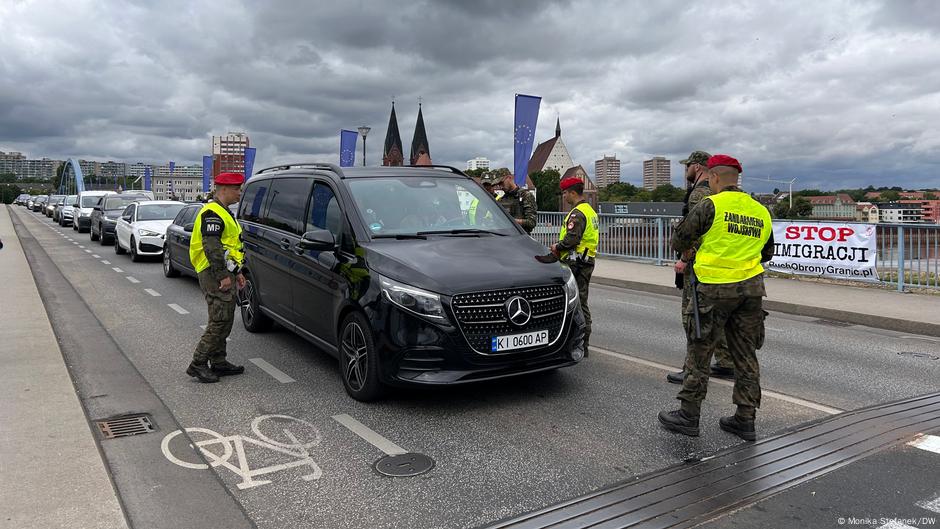The Changing Face of the German-Polish Border
For many years, the border between Germany and Poland was a seamless part of daily life for residents in the region. People crossed back and forth without hesitation, relying on the freedom of movement that the Schengen Agreement provided. However, this sense of normalcy is now being disrupted as both countries have reintroduced border checks.
The bridge connecting Frankfurt an der Oder in Germany with Slubice in Poland has become a symbol of this shift. On either side of the structure, rows of EU flags are displayed, while signs bearing the phrase “Ohne Grenzen. Bez Granic” — meaning “without borders” in German and Polish — remind passersby of a shared vision. Yet, these words no longer reflect the current reality. Since October 2023, Germany has been conducting random border checks, and Poland followed suit on July 7, 2025, marking a significant change in how the border is managed.
A Response to Migration Policies
Poland’s decision to reinstate border controls at 52 crossings with Germany and 13 with Lithuania was influenced by Germany’s stricter migration policies. Under the direction of German Interior Minister Alexander Dobrindt, the Federal Police have been allowed to deny entry to asylum seekers since May. This policy, which has sparked controversy, has led to increased scrutiny from Polish officials.
The situation has created tension among local residents, many of whom feel that the new measures are more political than practical. Arkadiusz, a Polish resident visiting the area, expressed frustration, stating that the border checks are more about “political show” than addressing real threats. His wife, Dorota, echoed similar sentiments, noting that the changes will make life more difficult for those living near the border.
Daily Life and Travel Challenges
The impact of the border checks is felt most acutely in everyday routines. For example, 17-year-old Lilith, a student from Frankfurt an der Oder, has noticed that her Polish friends often face delays due to traffic congestion caused by the checks. She fears that the situation will worsen now that Poland has also implemented its own controls.
These challenges extend beyond students. Many residents rely on the border for essential services, such as shopping, medical care, and commuting. The disruption of these routines has raised concerns about the long-term effects on the region’s economy and social fabric.
Citizen Patrols and Conspiracy Theories
In addition to official border guards, self-proclaimed “citizen patrols” have emerged along the border. These groups, often associated with the Border Defense Movement, have been seen monitoring crossings and filming police activities. While some members wear neon hi-vis vests, others remain discreet, avoiding direct confrontation with authorities.
Tomasz, a local from Slubice, supports these patrols but believes they should focus on areas other than the main crossings. He claims that there are conspiracy theories suggesting that migrants are being secretly transported through the forests. Although there is no evidence to support these claims, they highlight the growing distrust and anxiety among some residents.
A Call for Unity and Understanding
Despite the tensions, some residents advocate for a return to the free movement that once defined the region. Jan Augustyniak, a German citizen from Frankfurt an der Oder, worries that the Schengen Agreement is losing its relevance as more countries impose restrictions. He points out that when Germany first introduced border checks, they were only supposed to last three months, yet now, nearly two years later, the situation remains unchanged.
Frankfurt an der Oder and Slubice have long been considered a model of European integration. Over the past 30 years, the cities have developed strong ties through joint projects, including a shared district heating system and educational programs that teach both languages. The daily interactions between residents—whether for groceries, meals, or visits—have been a testament to this unity.
The Human Side of the Border
At the border itself, the atmosphere is tense but largely peaceful. Polish border guards conduct routine checks on buses and vehicles, while some pedestrians are asked to show their documents. The process seems arbitrary, with appearance often determining who is subjected to closer scrutiny.
On one occasion, two Chechen women were turned away because they lacked passports despite having valid German residence permits. Their attempt to shop in Slubice ended in frustration, highlighting the personal impact of these policies.
Looking Ahead
As the border checks continue, the residents of Frankfurt an der Oder and Slubice remain divided in their opinions. Some see the measures as necessary, while others view them as a threat to their way of life. The challenge lies in finding a balance between national security and the cultural and economic ties that have long defined this region. Until then, the bridge between the two cities will remain a symbol of both division and connection.






